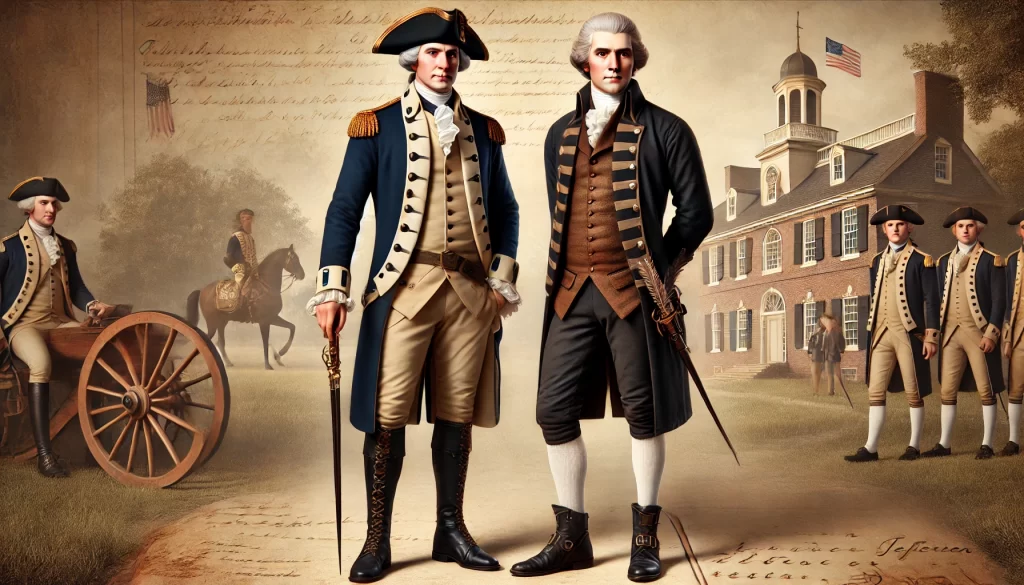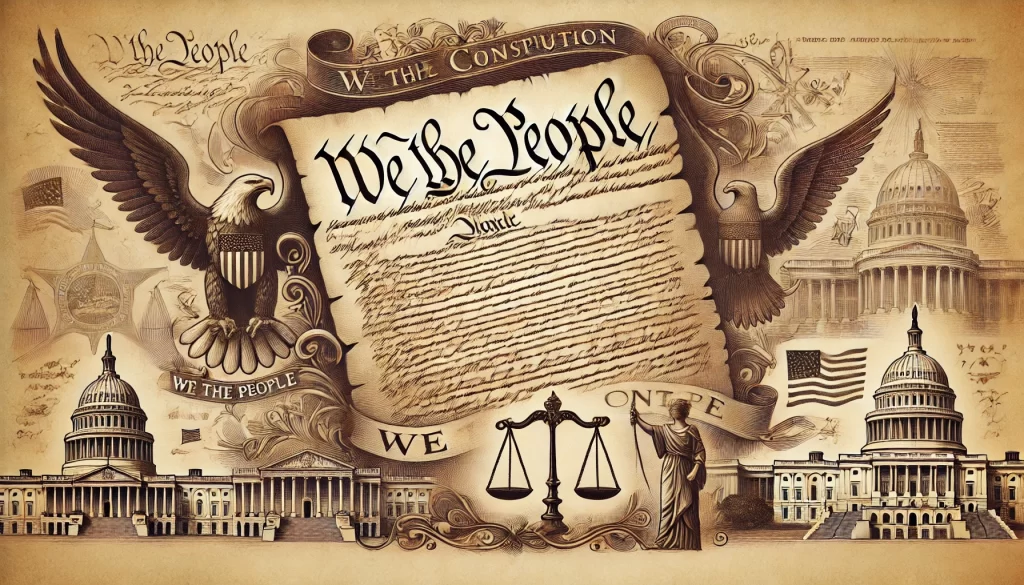
In considering what George Washington and Thomas Jefferson might think of today’s political situation, it’s tempting to view their perspectives through the lens of nostalgia, believing that the founders had an idealistic vision that, if followed, would have prevented many modern problems. It’s impossible of course to know what they may have thought about our current environment. Certainly, such things as a 24-hour news cycle on cable television and social media would have been beyond their comprehension. While both men lived in a vastly different era, their writings and philosophies give us a sense of how they might respond to the polarization and tensions we witness today.
George Washington: A Warning Against Partisanship
George Washington was deeply concerned about the rise of factions in the United States. (Political parties as such were unknown at the beginning of our republic.) In his famous Farewell Address in 1796, he warned that factions could lead to division and weaken the unity of the country. Washington was worried that faction (party) loyalty would surpass loyalty to the nation, creating conflict between groups and impairing the ability of government to function for the common good. He feared that excessive partisanship would “distract the public councils and enfeeble the public administration,” leaving the nation vulnerable to foreign influence and internal discord.
If Washington could observe today’s political environment, he likely would be saddened by the partisanship which dominates political discourse. The gridlock, belligerent rhetoric, and divisiveness we experience today demonstrate the appropriateness of his concern. Washington would likely advocate for a return to greater civility, urging Americans to focus on the common good and to set aside factionalism for the sake of national unity. While political parties have become integral to our system, Washington would likely still press for cooperation, mutual respect, and compromise among all groups.
Thomas Jefferson: Liberty, Democracy, and the People’s Role
Thomas Jefferson, while more supportive of political parties than Washington, had his own complex views about governance. Jefferson believed in the power of the people to govern themselves and was a passionate advocate for liberty, democracy, and decentralization. He distrusted concentrated power, whether in government, or economic institutions, and feared that it could lead to tyranny. Jefferson was famously a champion of agrarianism and believed that widespread participation in the democratic process was the best defense against corruption and the loss of liberty.
Jefferson, while a proponent of states’ rights and individual liberties, might view polarization as a threat to democratic ideals if it stifles dialogue and compromise. He believed in the potential for free men to govern wisely, but would caution against the erosion of civil discourse that might follow the rise of extreme factionalism
Faced with the highly charged political debates of today, Jefferson would likely express concern over the increasing centralization of power in government, banks, and large corporations. He would, without doubt, be troubled by the outsized influence of money in politics.
Jefferson was also a firm believer in education as a cornerstone of democracy; he would stress the importance of an informed electorate, particularly in an age where misinformation can spread rapidly.
However, Jefferson was no stranger to political conflict, having played a central role in the fiercely partisan battles of his time. He understood the value of vigorous debate but would probably urge that such debate remain focused on the core democratic principles of liberty, justice, and equality rather than devolving into personal attacks.
Media and Civil Discourse
Of course, it is impossible to know what Washington and Jefferson would think about the current role of media, particularly social media which would be beyond anything in their experience. Washington felt strongly aggrieved by the attacks upon him in the newspapers of the time. He felt unfair attacks would undermine national unity. Jefferson, on the other hand, was a strong proponent of freedom of the press. He was also very adept at the use of newspapers to accomplish political means.
However, it is likely that both would caution against the dangers of misinformation and partisan bias to distort public perception. Most likely both would emphasize the need for a responsible press that distinguishes between fact and opinion and supports a healthy democracy. Both would be opposed to using false or misleading statements to influence the public.
Unity and Civic Responsibility
Despite their differences, both Washington and Jefferson would likely agree on one thing: the importance of unity and civic responsibility. They envisioned a country where citizens were deeply involved in a participatory government, contributing not just with votes but with informed, constructive dialogue. Washington would call for a spirit of national unity above party lines, while Jefferson would insist that the preservation of liberty relies on active and informed participation from the public.
Both founders would encourage a healthier, more cooperative political environment, one where differences are respected and not allowed to fracture the country. They would likely see today’s polarization as a threat to the very ideals they fought to establish, and both would urge Americans to remember their shared values.
Conclusion
In short, George Washington and Thomas Jefferson, while men of their own time, had insights that are still relevant today. Neither man could have predicted the exact nature of modern politics, but their wisdom offers enduring guidance: political disagreements must not undermine the unity, liberty, and civic responsibility that are the foundation of the American experiment. We owe it to them not to lose the promise of the American Revolution.



What Would Ronnie Think?
By John Turley
On October 21, 2024
In Commentary, Politics
Thoughts on Ronald Reagan and the Current State of the Republican Party
I think Ronald Reagan may have been the best president of the modern era. I know that will make my liberal friends cringe. Additionally, I have recently gained new respect for Clinton and Obama, and I know that will likewise make my conservative friends cringe. I’ve always considered myself to be more conservative than liberal. But I just cannot support the current direction of the Republican Party and now consider myself to be a “Recovering Republican”. I didn’t leave the Republican Party. The Republican Party left me. And I wonder “What would Ronnie think?”
Speculating on what Ronald Reagan might think of the modern Republican Party is risky and involves consideration of his political philosophy, policies, and the values he championed during his presidency from 1981 to 1989.
Key Points of Reagan’s Ideology:
Speculation on His Views of Today’s GOP:
In summary, while Reagan might appreciate certain aspects of the modern Republican Party, such as a commitment to conservative economic principles, he would likely be critical of the divisive politics, populism, and the lack of bipartisan cooperation that he valued. Reagan’s views might resonate with traditional conservatives who still value free market principles. Likely though, they would face pushback from factions within the party that prioritize the nationalist policies. Many Republicans today see Reagan’s approach as outdated or incompatible with their current priorities which emphasize immediate economic protection over long term global engagement. This assessment is speculative, of course, and based on my interpretation of his beliefs and leadership style.
For a deeper dive into Reagan’s legacy, consider reading more from the Ronald Reagan Presidential Foundation (www.reaganfoundation.org)
/